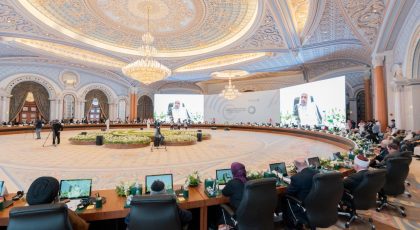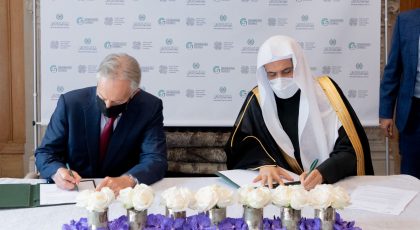
The United Nations High Commissioner for Refugees (UNHCR), in partnership with the Muslim World League (MWL), issued today its semi-annual report on Islamic charitable work for 2021, which highlights the impact of donations from Zakat and alms money received by the UNHCR through the Zakat Fund for Refugees on the lives of refugee and displaced families.
The report shows that 584,586 refugees and forcibly displaced people in twelve countries received assistance in Yemen, Syria, Lebanon, Jordan, Iraq, Egypt, Mauritania, Nigeria, Bangladesh, India, Pakistan and Malaysia.
The report also shows the total contributions of Islamic charitable work received during the first half of this year, which amounted to 27.5 million US dollars, of which Zakat donations account for more than 70%.
The report, in its new digital and interactive format, was disclosed in a panel discussion held this morning at the MWL’s pavilion at Expo 2020 Dubai, in the presence of a number of representatives of humanitarian and international bodies and media agencies.
The report sheds light on UNHCR’s main partnerships in the area of Islamic charitable work, especially with the MWL, which resulted in the issuance of a new fatwa by its Islamic Fiqh Academy to be added to the Zakat Fund for Refugees’ register, which has more than 10 fatwas issued by senior scholars and fatwa centers. This is in addition to the generous grants provided by the MWL to support refugee and displaced children in Africa, the most recent of which was in support of a project aimed at protecting the most vulnerable children in northeastern Nigeria, which contributes to assisting 3,699 internally displaced children.
In this context, Khaled Khalifa, UNHCR Representative to the Gulf Cooperation Council and Advisor to the High Commissioner for Islamic Finance, pointed to the importance of expanding strategic partnerships with organizations and bodies concerned with Islamic charitable work to support international humanitarian efforts, saying: “Given the increasing levels of forced displacement in recent years and the extension of humanitarian crises as a result of wars, violence and persecution, the Islamic charitable work plays a pivotal role in responding to the increasing humanitarian needs, through its basic tools such as zakat, alms and endowments, to achieve shared humanitarian visions, and to explore more ways to support refugees and forcibly displaced people around the globe.
For his part, Mishaal Al-Shaalan, Director General of the MWL’s International Cooperation and Events, stressed the importance of strengthening Islamic charitable work to serve humanitarian issues, including the issue of forced displacement.
He said: “We continuously seek to enhance the MWL’s humanitarian role, which is at the core of our tasks and work since our inception. The best way to do that is to develop strategic partnerships with effective humanitarian institutions at the international level, such as the UNHCR, which we have been working with for years to extend a helping hand to refugee and displaced families in areas affected by wars and disasters.”








